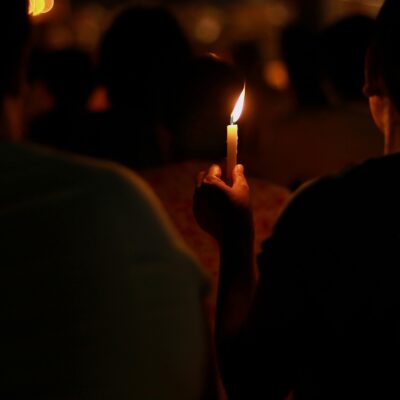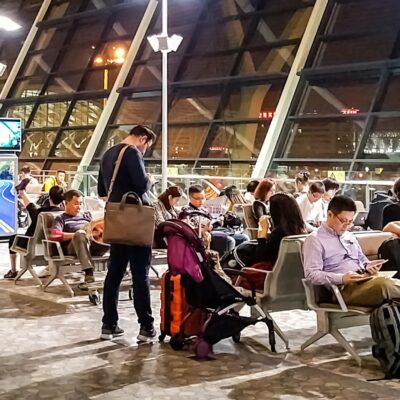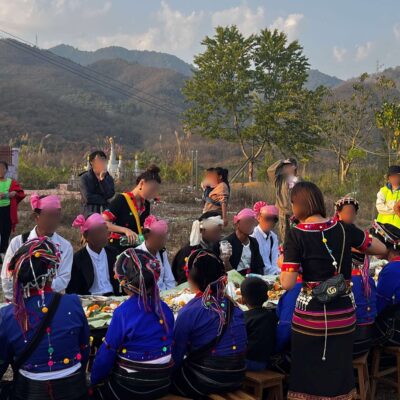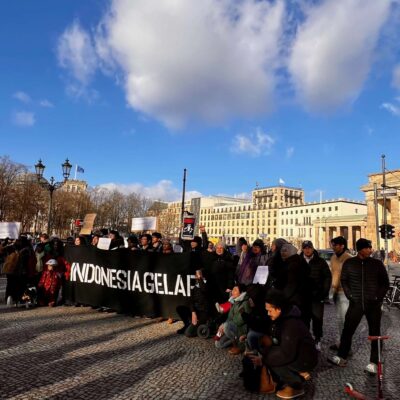Thinzar Shunlei Yi is a young democracy activist and human rights defender who is campaigning globally against the military coup in Myanmar that began on February 1, 2021.
Forced into hiding, she is the advocacy coordinator for Action Committee for Democracy Development, a coalition of 12 community-based social and political networks established in 2013 to build a democratic federal state in Myanmar.
She spoke with Melbourne Asia Review’s managing editor Cathy Harper about the state of civil society in Myanmar.
What has happened to you since the coup?
Before the coup, we were planning voter education for upcoming local elections. We had printed thousands and thousands of pamphlets to distribute to different states and regions. We were campaigning for universal suffrage at the local level. Everyone can vote at national level elections, but only one per household can vote in local level elections, and these are all men designated as the leaders of the households. We were advocating for the rights of young people and women to vote in local elections, but the elections were cancelled because they were due to happen in the first week of February 2021 and all the initiatives totally collapsed when the coup happened.
We protested the whole of February and there were some shootings. They [the military] started with rubber bullets and water cannon and then in some areas they used actual ammunition. We thought they would not crackdown on us using real ammunition in Yangon or Mandalay, but at the end of February they started using real ammunition and we couldn’t organise anymore. They were arresting people at midnight and I was forced to flee. I’ve been charged under 505a of the Penal Code related to incitement against the military and I could be jailed for three years.
It took me more than six days to get to where I am. Normally it’s just an eight-hour trip – there was an 8pm curfew and because of security I needed to stop between communities. There were many different organisations helping us and also local people sheltering us and giving us space to sleep. The border was closed because of COVID-19 which made it harder for us to cross, but my organisation has experience and contacts. We didn’t need to pay a lot of money to human traffickers – we didn’t get trafficked. On the Thailand side there were other organisations who picked us up and who quarantined us. There were more than 50 people who made this trip happen including cyclo drivers, car drivers and local community village leaders.
I have ‘survivor guilt’. I am in a safer zone than Myanmar so for short times I can sometimes neglect what is happening in Myanmar and then I feel guilty. It’s a constant struggle inside my mind every day. I can’t use my Myanmar passport and Myanmar ID card because the Thai government is not a pro-democracy government and there is an alliance with Myanmar government. We are worried if they report us to the Myanmar government then they could make an exchange ‘we give you these activists and you give us this’. We have to face this constant threat. We don’t say where we are exactly. They deport many people every day.
What continues to motivate you?
There are a lot of factors. Part of it is exposure to what is possible as a nation – as an activist I got to see what is happening in Thailand and Cambodia and other countries and learn about what is happening with other young people’s aspirations. Before, I learned only from reading and looking at newspapers and they were all censored. But when I got to travel that gave me motivation and inspiration to try to build something new.
I was raised inside the military and lived there for more than half of my life. When I look back, there was patriotism and extreme nationalism, patriarchy – totally unfit for the modern world. I wanted to relearn things and become a human rights activist. I’m in a position to do more than others because I have lived inside the military, and I need to contribute more back because I was in a privileged position.
My father has been retired from the military for ten years. You can imagine if my father was still in the military I might already be in jail. We have a lot of debates inside the family about what I’m doing and what they believe in. My family is religious, patriarchal and conservative, but at the same time my father is quite liberal and he raised me to be independent. My father was a role model and he motivates me to be who I am and be accountable for what I’m doing, but there are a lot of things we disagree on. He does not agree with dismantling the military and we have a lot of debates of course. But my family appreciates each other for who are and they don’t try to stop me from what I’m doing.
Can you describe the state of civil society resistance in Myanmar now, coming up to two years after the coup?
Some civil society organisations have stayed inside the country and do what they can, but they have changed their names and maintain a low profile. Other civil rights and democracy organisations who are very vocal about Myanmar’s situation and are against the military can’t remain there because the leaders of these organisations have been charged and accused of being criminals and terrorists. Many of the National Youth Congress leaders are now in jail. One of their most prominent leaders, his nickname is Panda, he has been charged and is now facing a lengthy jail sentence. Activists have different thoughts about what they should do. Sometimes they join the defence [resistance] forces or they may leave the country. Civil society is disorganised now.
I would say 60 percent of youth leaders are now in the people’s defence forces – they are joining the revolutionary and resistance groups. They are trying to reclaim their territories and defend their communities with homemade weapons like grenades. We need to delegitimise the military as a government and we need recognition of our own government as the government of Myanmar. The revolutionaries have to reclaim the infrastructure as their own, townships, building, offices and reclaim territory so that international governments will recognise the people as the government of Myanmar.
They don’t think the US or UK governments will help with weapons like in Ukraine. The resistance in Myanmar have to fight for themselves. They go into the jungle and make shelters and help the internally displaced people and defend communities from the military. Almost everyone is facing the consequences of our activism and our organising. There is no other way but to keep going. It’s survival of the fittest – the military or us. The military isn’t very big but they have advanced technology, they have fighter jets and weapons. Recently they sent three fighter jets to ethnic controlled areas and they killed more than 60 people and injured more than 100. There was a music festival in Kachin state and they bombed the people there.
Would you say anti-regime sentiment is as strong and active as when the coup first happened?
I have been an activist for the last ten years. Before the coup, the biggest protest that happened in Yangon was only 300 people in 2018, but when the coup happened a million people, thousands and thousands were on the streets. I was amazed about our young generation – there are many young people who are giving their lives for democracy and human rights. The injustice, the oppression and the brutality is intense – that’s why there is pushback. I am really concerned with civilians – they don’t know how to make grenades, they don’t know how to make landmines. Many, Masters graduates, doctors, lecturers from universities, and teachers are now trying to make their own handmade weapons and they lose their limbs, their legs their eyes, by testing these.
After 20 months there is a stagnation, but at the same time there are many more reasons we have to keep on fighting. The ethnic resistance forces have been resisting for more than six decades. Why not us, why not Burmese? I don’t think we will go back to the status quo because we have lost a lot already. We all deserve a better future.
You said the injustice and oppression are intense. How does play out for people in Myanmar, many of whom are probably trying to live as normal a life as possible?
The internet, the telecommunications and electricity companies are all in control of the military. When the military is suspicious of a person or a group they shut down the internet and the telecommunications to their communities. It’s a blanket ban which the military has sometimes imposed not just since the coup but also before in Rakhine state the military ordered a shutdown which lasted for nearly two years. More than a million people suffered the consequences in the middle of the pandemic. They shut everything down before they carried out the coup. When someone posts something on Facebook critical of the military or, for example, a picture of Aung San Suu Kyi they can be charged. There will be screenshots recorded by pro-military monitor groups and within a week they will be dragged into jail. When you are travelling your phone could be confiscated at any time. If you are on the Facebook app they will check and if they see something suspicious you will be dragged out of your car and you can be charged. They will do whatever they feel they want to do: beat you up, kill you on the spot, or sexually abuse you.
Even for businesspeople who don’t join the resistance, they can’t install a VPN, because if the military checks people’s phones and if they see a VPN you can be jailed. You have to make sure you have cleared things out before you leave the house. If you are a rich person, the military will ask you for a lot of money. When you are rich or middle class and proactively supporting the military you have protection, but if you stop actively supporting military then they will confiscate your belongings.
Do you have any concerns about the behaviour of the resistance groups?
The military act like terrorists. They kill people, they behead people, they rape people. The brutality is insane and many people think ‘we would do the same thing to you’ – this is the instant natural response. There was a 16-year-old boy who got jailed for his activism in the protests and his father and mother were killed by the military because of his activism. He escaped the juvenile prison and now he is with us in the same area, but he lost his parents and is still suffering. I’m worried about many different things, especially our young generation – if they are not guided ideologically they will begin acting like the military as revenge. We are reminding our people that we are not like the military, we are not like these criminals. We remind our soldiers to follow the Geneva Convention and show them how we are different.
We are still trying to educate younger generations against all extremist ideas. Every Sunday at 7pm we invite different speakers from different areas to talk about the ideas of the military and what other ideas we should adopt for a fair democratic nation. We’ve even invited former military soldiers and ask them to talk about their experiences inside the military. We also have spouses of the military soldiers speaking up about how there is not women’s rights inside the military and some of them were sexually abused. They are also the victims of the system. The message we try to send is that the future we are building is also for you.
How should international civil society and government engage with Myanmar?
By not recognising the military as the military – that would be a big help to us. For example, when we see leaders or representatives of governments meeting with the State Administrative Council, such as the Australian Ambassador in April, we say ‘don’t recognise them as the government of Myanmar, they are not the government of Myanmar just because they have bigger weapons.’ We need help, that’s the second thing. Because of the intense oppression and censorship and monitoring we need more flexibility from our international donors and international community to help Myanmar civil society.
Main image: Candles being burned in Yangon. Credit: Alex Berger/Flickr.




